How the rebel Sulla destroyed republican rule in Rome
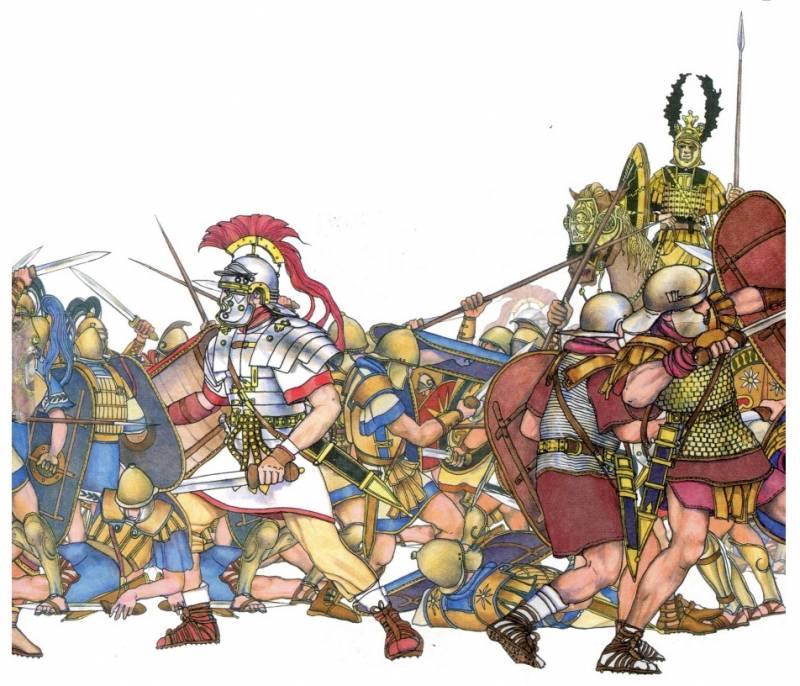
This article continues the story of the first rebellion, which took place for the first time in the Roman Republic, and the author of which was Lucius Cornelius Sulla.
Anticipating this story, I planned to draw the attention of readers to the key, I would say, fundamental issues in the development of Roman society at that time, which determine all other events.
But a number of respected readers raised the question of whether Sulla's rebellion was the first in stories Rome? And why does the author not consider the events when the Romans eliminated the royal power as a rebellion?
Firstly, because the author does not express his opinion, but always relies on the position of modern historians and ancient historiography. And the ancient Roman authors considered the expulsion of the king not as a rebellion, but as a legal act and the right of the Romans. While the campaign of a professional army against Rome was not such.
Secondly, in the Russian language there are many designations for such phenomena, but there is a stable tradition that most often designates a rebellion not as a movement of the masses, but as an uprising of military units against the authorities, for example, the Kornilov or Kronstadt rebellion, although, again, based on traditions, the streltsy movements of the late XNUMXth century are most often called a revolt, perhaps because, along with the military police, other social elements also participated in it.
But back to the Roman tradition. More precisely, let's consider the situation with the uprising against the last Roman king Tarquinius the Proud, and turn to scientific methodology.
The Roman “king” is not a king in our modern sense, not a monarch, as, for example, Nicholas II, the legitimate sovereign, autocrat of All Russia. Legally, the power of the Russian tsar is the supreme power, that is, without the slightest restrictions: the tsar is the only source of supreme power.
Unlike early Rome, where the king, in modern terms, never had such a prerogative. The “king” in Rome was the leader of the tribe, just at the time of the beginning of the collapse of tribal relations and the formation of the society of the territorial and neighboring communities. The society consisted of clans, the "king" did not possess any supreme power, he did not have "state power" either.
Modern historians and anthropologists point out that the presence of names for rulers: rex, prince, pan, zhupan, etc., does not in any way indicate the existence of a state or a monarchy, but indicates that this society is at a certain stage of development, where over next to the clans, the eldest in the clans or the senior leader of the tribe predominates. So it was absolutely with any tribe or union of tribes in the history of mankind. In such a society, some kind of government appears, but even in a pack of monkeys there is control and hierarchy, which does not make a pack of highly developed great apes a “state”.
Management in the tribe is primarily associated with sacred and judicial functions. The tribe is ruled, one might say, by “dad”, “patriarch”, “patrician”, an elder who sacredly possesses the key economic skill of this society: in an agricultural society, he knows when to sow, when to plow, but most importantly, he ensures the harvest and victories in a war with enemies, not so much because he knows how to chop or plow better than anyone, although he can’t do without it, but because he has a greater connection with the Gods than anyone in society.
But just because of this, he knows how to plow and chop better than anyone. Interconnected process. The sacred function is more important than all the others in such a society, and in the face of external threats (military function), the sacred leader had to fight and protect the territory of the tribe, lead campaigns for missing resources and punish neighbors who did not honor the Gods enough.
Therefore, the exile of the king in Rome was, as it were, an uprising of the “children” against the “father”. And this happened during the collapse of the tribal organization, when the "king" was no longer one of the "patriarchs", and the cause of the uprising was Tarquinius's claim to supreme power. It was certainly not a rebellion: bees against honey?
The next thing is that the ancient Romans would be very surprised if they knew that they had some kind of state, this is a Russian word that comes from the name of the owner of the court and family, the sovereign. In Rome, there was nothing of the kind and could not be: the political structure of Rome was a republic - a common or public cause. We traditionally call it the Roman state.
There was a fierce political struggle in the republic, even a "strike" - the flight of the plebeians, the confrontation was often accompanied by violence and murders, but no armed movement against the Fatherland, an uprising of the army, and the army was a militia of all men, could not be against the Motherland: the structure of society allowed. Against whom will the army rebel, against their wives and mothers?
But as soon as there was an instrument that made it possible to participate in the political struggle from a position of strength, namely a professional army, immediately rebellion became possible. And the tough political struggle turned into rebellions, and they turned into a civil war.
Why did the army become an instrument of rebellion?
While the institutions of governance (the senate, the consulate and the popular assembly) coped with the management in ancient Roman society and met its needs, Roman society not only existed, but actively developed, like all states and ethnic groups at that time, along the path of expansion.
It was such a society, with such a system of government, that was able to subjugate Italy and defeat the oligarchic Carthage, after which it managed to conquer or put the Hellenistic states under its control.
At the same time, a political struggle was constantly going on in Rome, at first patricians and plebeians, then optimates and democrats, it also stabilized Roman society in front of the outside world, but for the time being.
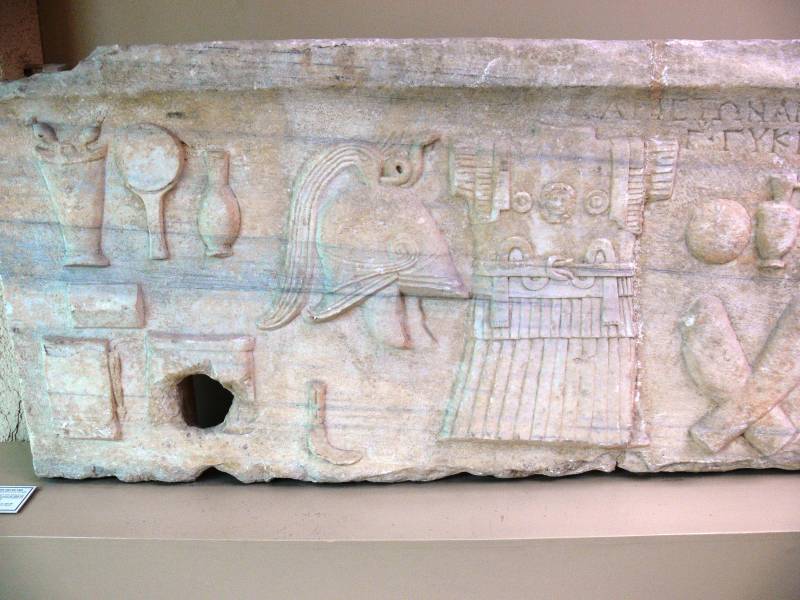
Agriculture was at the heart of the Roman economy. The entire population was engaged in the cultivation of the land. And with the development of the city and the growth of the population, the “land issue” arose before the community of Rome in full growth. The agrarian question was a key issue over which there was a split in society, the struggle for land was the main political struggle in Rome. At the same time, the farmer was a militia warrior who ensured victories and security for their city-state.
At first, it was a struggle between the first settlers of the city, its founders, heads of clans, patricians and settlers who later settled from different regions of Latium, the plebeians.
Of course, there were impoverished senators and wealthy plebeians, but social division went between the former and the latter.
As I wrote in the previous chapter, military expansion, when the city-state very quickly turned into a huge empire by the standards of the ancient world, caused economic difficulties for most Romans, which was reflected in social struggles. The wealth gained as a result of the conquests had nowhere to invest, except for the land. This led to speculation.
The inability to manage the captured provinces forced Rome to use the system of farming out, which led to corruption, bribery, uprisings and again to the corrosion of land relations. As one would say today, the unsecured money supply dominated the economy. The constant influx of slaves makes it possible to use them in agriculture and contributes to the intensification of agricultural production.
All this massively ruined landowners who spend time in wars and cannot work normally on their lands. And the natural growth of the population leads to the fact that there is not enough land: not the “housing”, but the land issue spoiled Rome.
Rome as a city-state was, first of all, not a "city of crafts and trade", but, like all ancient cities, an agricultural center.
Surplus money supply (coins) makes it possible to develop "banking" monetary transactions, which were, as in any underdeveloped society, usurious.
If debt slavery in Rome was abolished earlier, then the presence of a mass of debtors and usurers became a landmark for the period of the last century of the republic.
The presence of albeit primitive, but commodity-money relations, in conjunction with the above phenomena, contributed to the emergence of economic cycles: rapid growth was replaced by no less rapid decline in the economy. As we would say today, the money supply had nothing to do with a primitive agrarian economy.
Oh yes, in Rome there were even works on agricultural technologies, but they did not determine the face of the economy as a whole.
This causes massive pauperization of citizens. For such citizens, by decision of the populace, distributions of bread began in Rome.
In political terms, representatives of different classes, but above all aristocratic, thought about the situation, but they saw a way out in a return to the conservative norms of the early republic, which in the current conditions was a complete utopia.
The multidirectionality of social interests led to an imbalance in the management system, and so completely inconsistent with the needs of a huge country. In the presence of three estates, the division took place according to the level of wealth and poverty.
And the more often there were crises that the management systems of society were unable to cope with, the stronger social discontent grew, which led to mass violence.
The struggle was between the optimates and the populace or democrats, between the landed aristocracy, the horsemen, as a financial social group, and the plebeians with the Italics. From time to time, one or the other party seized power, but none of them could gain an advantage: the optimists held back changes, the populi sought to reform the majority.
This struggle began to destroy public institutions and society itself. And so it happened until another force appeared that could contribute to the establishment of a single principle in the management of society. It was a professional army.
There's a civil war going on
As soon as Sulla, having put "order" in Rome, went to Asia against Mithridates, Gaius Marius, the creator of the Roman professional army, captured the city after the siege.
While Sulla fought heroically with Mithridates, the "democrat" Marius arranged for his opponents in Rome, the optimates, a real massacre with beheading.
The leaders of the optimates Gnaeus Octavius, Lucius Julius Caesar and other prominent optimates and supporters of Sulla were killed, and Maria's military ally, the former consul Quintus Lutacius Catulus, committed suicide.
Patrician Lucius Cornelius Cinna, the leader of the democrats, was able to stop the violence in Rome only by killing the unrestrained warriors of Mary. The next election of consuls was won by the leaders of the democrats, Cinna and Marius, who soon died.
Cinna, having become a de facto dictator from 87 to 85, adopted a number of laws as part of the fight against the economic crisis: he wrote off part of the debts, carried out a monetary reform, increased the distribution of bread and evenly distributed citizens among the electoral tribes.
And Sulla, fighting in the east and personally showing miracles of courage, signed a forced treaty with Mithridates and informed the Senate that he was returning to Rome. Legally, it was again a mutiny.
The Senate, realizing the precariousness of the situation, was ready to negotiate with the rebel, but the consuls were not ready for this, both as leaders of the democrats and as supporters of the Roman "constitution". They preferred to resolve the issue by force. But the soldiers, who did not want to go on a campaign in winter, which could never have happened before, killed the consul and the leader of the democrats, Cinna. Sextus Aurelius Victor wrote:
As we noted, the professional army had its own ideas, different from the public ones.
Despite the fact that the new consuls, Gaius Norbanus and Lucius Cornelius Scipio, nevertheless gathered a large army, exceeding the army of Sulla, their army was inferior in combat qualities to the victorious Mithridates, and after the death of Cinna, the democratic party in Rome did not have real, charismatic leaders. In 83, Sulla defeated the army of the consul Norbanus, and the army of the second consul passed to him. For the year 82, new consuls were elected Carbon and Gaius Marius Jr., 22 years old. It was he who met the legions of Sulla in Latium, where the battle took place.
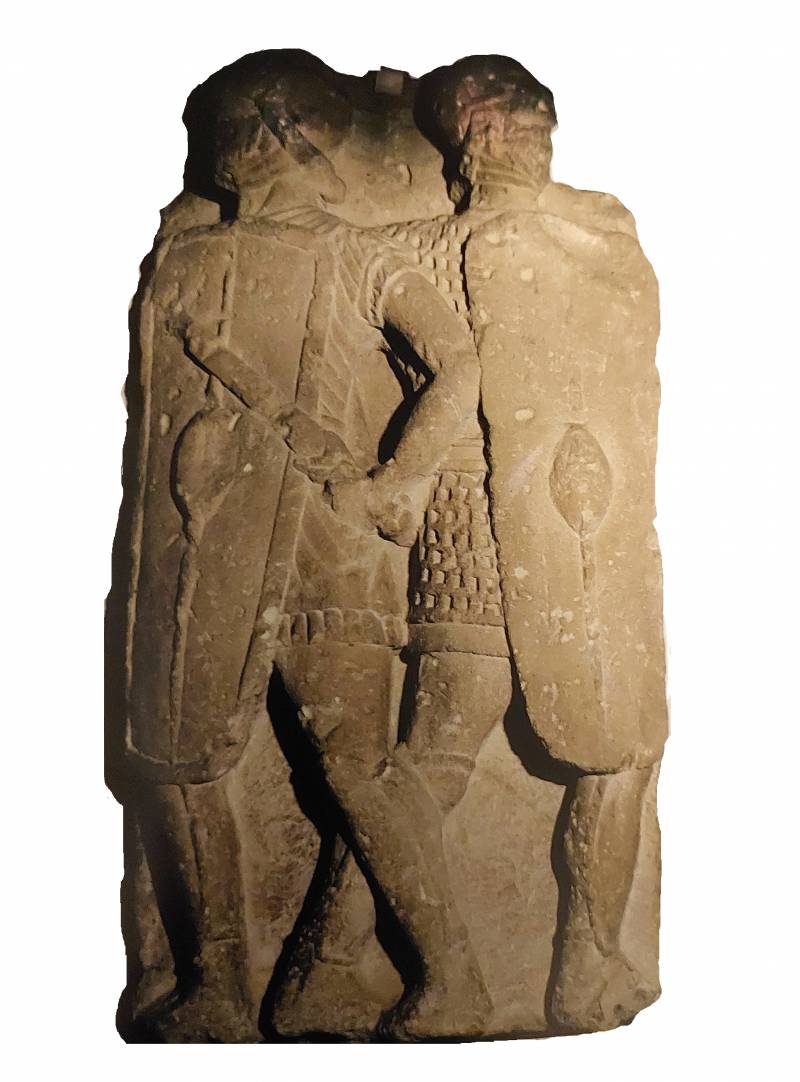
The inexperienced Marius was defeated, Sulla entered Rome and immediately went to the north of Italy to help Metella, Pompey and Crassus. While the struggle was going on in northern Italy, the tribes of Samnites and Lucans, allies of the democrats and enemies of Sulla, moved against Rome. November 1, 82 there was a grand battle at the walls of Rome. The Samnites pushed Sulla's troops back to the very Collin Gates, he rushed among them, persuaded, threatened, asked them to stop and not run. Sulla fought on a white horse, narrowly escaped death from two spears. While Crassus on the right flank was victorious. As a result, the Samnites and Lucans were completely exterminated.
How did the second rebellion in Rome end?
Captured in the amount of 6 thousand people, despite promises, Sulla staged a massacre in a circus in Rome. While he himself gave a speech in the Senate and advised the senators not to be distracted, as there he teaches a lesson to the scoundrels.
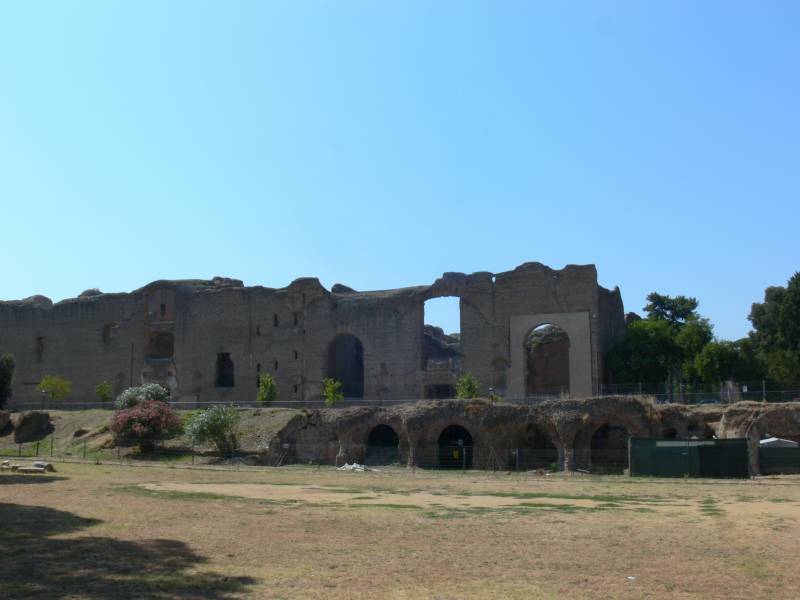
The civil war ended, and the remnants of the Marians were defeated in all provinces.
Sulla, like Marius, was a warrior, but the first one became famous for being funny and conscientious, therefore, when he made the first coup, as Plutarch wrote, everyone considered him a moderate "leader of the nobility and benefactor of the people." The civil war hardened his heart. Sulla's terror in 82–81 significantly surpassed the massacre in Rome, which the naturally ferocious Marius inflicted on the optimates. So in Rome they realized that one tyrant had replaced another.
Sulla, who outwardly formally acted within the framework of the Roman "constitution", after defeating his opponents, and at the same time the Roman consuls, gathered a popular assembly in Rome:
Brought up in the Roman political tradition, he tried to give his activities traditional legitimacy.
Here I have to make one digression.
Most people know that the so-called. Roman law is the foundation of legislation for many countries, the basis of jurisprudence. It is required to study in law schools.
But it should be remembered that the modern abstract concept of "Roman law", with which we are familiar from the codification of Justinian, did not have an abstract, some kind of "legal" character, as in our days. It was completely permeated with Roman religiosity, it was part of it. Without the gods, worshiping them, taking into account their will, there could be no question of any court and law.
Both Sulla and the rebel following him - Julius Caesar, and the founder of the principate Octavian Augustus, being thoroughly permeated with Roman religiosity and the political spirit associated with it, sought to correlate all their innovations with antiquity, rely on tradition. The development of history did not stand still, and with the further corrosion of Roman institutions, not without the help of the above, there was also the death of the old gods, which was reflected in the social structure and institutions of governance of the Romans.
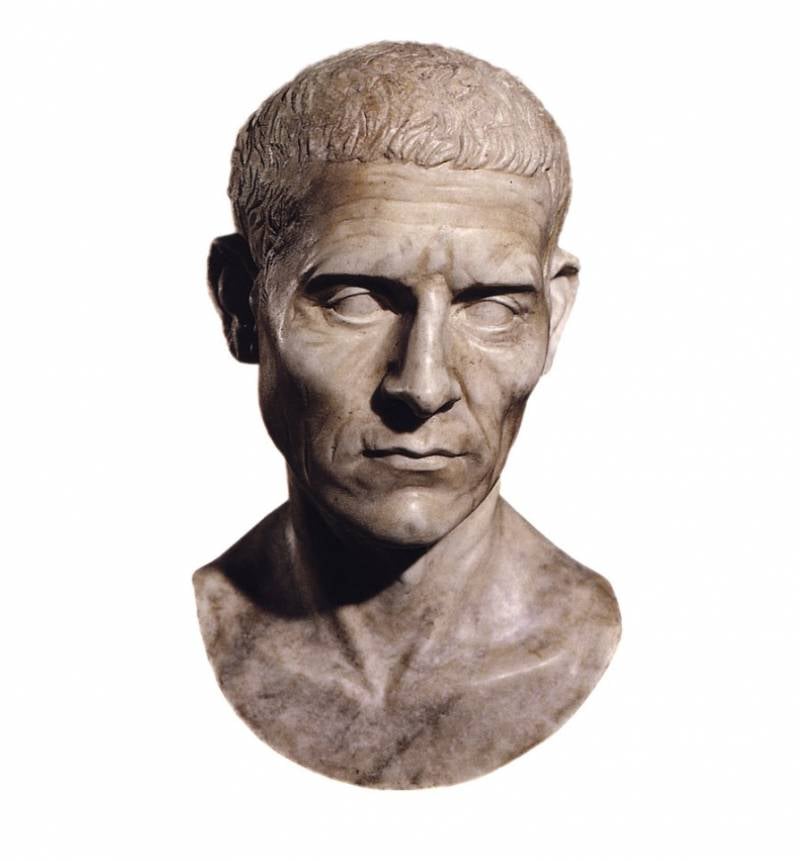
Several completely dissimilar busts attributed to Sulla have survived. This is one of them from the National Archaeological Museum. Venice. Italy.
Sulla formalized a dictatorship for himself, under the formal pretext of the death of the consuls in the civil war. "Intertsar", Princeps of the Senate Valery Flakk appointed him dictator, and the people's assembly approved such a decision, under the conditions of a military dictatorship there was no choice:
Even the terror against its opponents, which replaced the disordered massacre of the first days of Sulla's entry into Rome, was introduced into the external, formal framework of the law.
The dictator made proscriptions or lists, where the persons declared outlaws were indicated:
As a result, 5 thousand people died. Further, massacres began with urban communities in Italy, their lands and premises were transferred to the veterans of Sulla. There were about 100 thousand veterans, so they were placed throughout Italy, realizing that without Sulla they would not get well, they actively supported him even when he retired.
Sulla recruited ten thousand of the strongest and strongest of the proscribed slaves, gave them citizenship and made them his personal guards - Cornelians.
If earlier the institution of dictatorship always wore a temporary order, and they were endowed with it to solve emergency situations, now the dictatorship has acquired the form of tyranny, since it was not limited by any term:
Sulla observed the "constitutional" formalities and held elections of consuls, but he himself retained dictatorial powers and was accompanied as king by 24 lictors-axe-bearers, the consuls were completely subordinate to him.
Finally Sulla amended the legislation in accordance with "tradition". His goal was to stop democratic unbridledness, as it seemed to all the optimates, to bring Rome to the tranquility of aristocratic government and achieve "justice".
However, justice does not have a universal meaning, but always has an ethnic and political coloring: what is healthy for a Russian is death for a German.
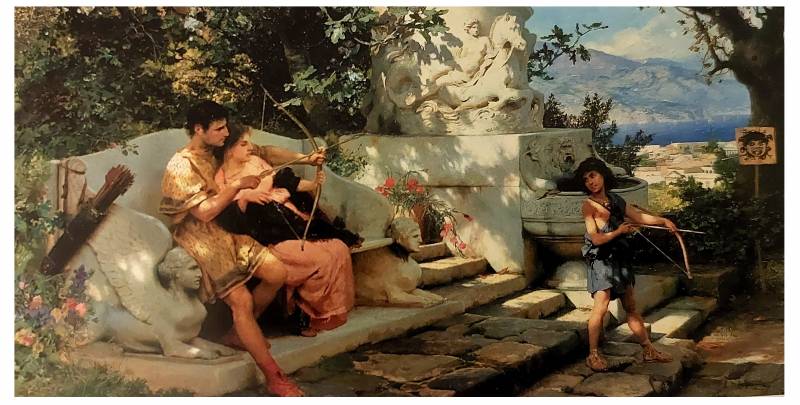
Based on what, he betrayed special importance to the Senate, increasing the number of senators: the former quaestors mechanically became senators. Therefore, the role of the censors controlling the appointment to the Senate, the most important control institution of the republic, was weakened.
But the expansion of the administrative apparatus was a positive development. This objectively corresponded to the needs of society: the old small apparatus could not manage a huge empire. A progressive reform of the administration of Italy was also carried out; the Rubicon River became its border in the north.
The cities of Italy received self-government, this was all the more easy to do, because all the elected posts were occupied by veterans of Sulla.
Subjectively seeking to return the power of the aristocracy, to recreate the senatorial republic, Sulla objectively destroyed the republican institutions: the people's tribunes could not hold curule positions, that is, they could not continue their careers, which made this most important elective position in the republican state machine unattractive. And the weakening of the role of censors made the appointment of senators uncontrolled.
The changes also affected the consuls, the highest executive power of the republic. Now one could become a consul only after going through all the steps of the managerial ladder, and one could run for a second term only after ten years.
Again, we see the interrelationship of processes in history, and there is no other way: the fall of one or several republican institutions led to the fall of all of them. It is impossible for one to exist without the other, that's exactly what history teaches!
And in the end, Sulla also adopted populist “conservative laws” beloved by all conservatives, who are often fans of luxury and debauchery at the same time: about luxury and excessive wastefulness, about marriage.
But... it didn't matter anymore, and here's why.
Sulla adjusted all three of the most important institutions of the republic: the senate, the consulate and the popular assembly. These changes were speculative, often taken under the pressure of the current situation. But it no longer mattered, because a return to a republican form of government was impossible, the real levers of government and control were concentrated by a rebel who became a usurper.
Historically, this was the only progressive way of development for Roman society.
About what further, and in 79 BC. e. Sulla abandoned the dictatorship and, according to Roman political tradition, confirmed his desire to answer for any actions during the period of the dictatorship, but there was no one who would have made such a claim to him.
He became a private individual, and all power was concentrated in the hands of his supporters or protégés. Sulla fell ill with some strange, shameful, from the point of view of ancient authors, lousy disease. Perhaps that is why he spent his last days in idleness and debauchery. Contrary to his own laws, the former Roman hero arranged huge feasts for everyone.
Personal addictions, power that corrupts, and absolute power corrupts completely, all these are just words. Personality certainly matters, but... if the leaders of the Democrats had won, was it possible that Rome would have gone the other way? More on this in the next article.
But I will not delay with the answer: of course not. Because in human society it is not individuals who determine the historical path of development, although they often direct it, but the development of productive forces and the systems corresponding to them that control society. Not Sulla, but different, although his monument on the Field of Mars was inscribed:
Mutiny is not a random action of armed men and their leaders, it is always an indicator of the disease of the current mechanisms of governance of society. Whether the lower classes want it or not, the upper classes can or cannot, it doesn't matter, the rebellion as a mechanism demonstrates that the social management system is incapacitated.
The road of historical development led Rome from "democracy" and a republic to an empire in the form of a military dictatorship. And Sulla, it happened, laid the foundations on the basis of which the administration based on personal, and not collective power, the Roman monarchy, would be erected.
instead of an epilogue
Sulla, during the terror, allowed not to kill the young man Julius Caesar, who was in the camp of his enemies. He was married to Cornelia, daughter of the leader of the democrats and consul Cinna, and did not want to divorce her at the request of the dictator. And his aunt was the wife of Gaius Maria, and he was the cousin of the consul Gaius Maria Jr., who fought with Sulla.
The riots to be continued...
Information